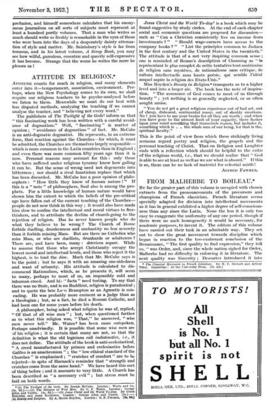FROM MALHERBE TO BOILEAU.* BY far the greater part of
this volume is occupied with chosen extracts from the pronouncements of the precursors and champions of French classicism. French literature seems specially adapted for division into intellectual movements as it has in general exhibited a higher degree of self-conscious- ness than any since the Latin. None the less it is only too easy to exaggerate the uniformity of any one period, though if there were no such homogeneity it would be necessary, for academic purposes, to invent it. The editors of this volume have carried out their task in an admirable way. They set out to show the great movement towards discipline which began in reaction to the too-exuberant conclusion of the Renaissance, "The first quality to find expression," they tell us, "was Order, and, since the whole nation sighed for Order, Malherbe had no difficulty in enforcing it in literature. The next quality was Sincerity ; Descartes introduced it into • The Classical Movement in Preach Literature. By IL F. Stewart and Arthur Tilley. Cambridge: At the University Press. [7s. net.]
thought, Pascal into morals, and both into literary expression." We find it difficult to attach any significant meaning to such generalizations, or rather we find it easy to attach too much. If it is meant that Montaigne had not Sincerity and that Ronsard did not know anything about Order, then we can only point to the works of the authors in question—where, amongst a great deal of waste matter, we shall find examples of Order and Sincerity which Veiture and Rueful and such lights of the succeeding age never approached. The quality, if a quality must be named which was introduced by the study of classical models in the seventeenth century, was Correctness—that was achieved at the expense, too often, of real Order and true Sincerity. It was not, however, in lyric poetry that the greatest work of the century had been done but by the philosophers Descartes and Pascal and by those numerous analysts of human passion among whom Racine represents the drama, Saint-Simon, La Bruyere, La Roche- foucauld, and La Fontaine, the study of human character in various forms. It is hardly necessary to say that a volume filled with characteristic passages from such writers cannot fail to be interesting. The explanation of French classicism is not so much to be found in the desire for abstract qualities like Order and Sincerity, as in the social conditions of the time, and the confinement of literary activity within the influence of the Court.



























































 Previous page
Previous page